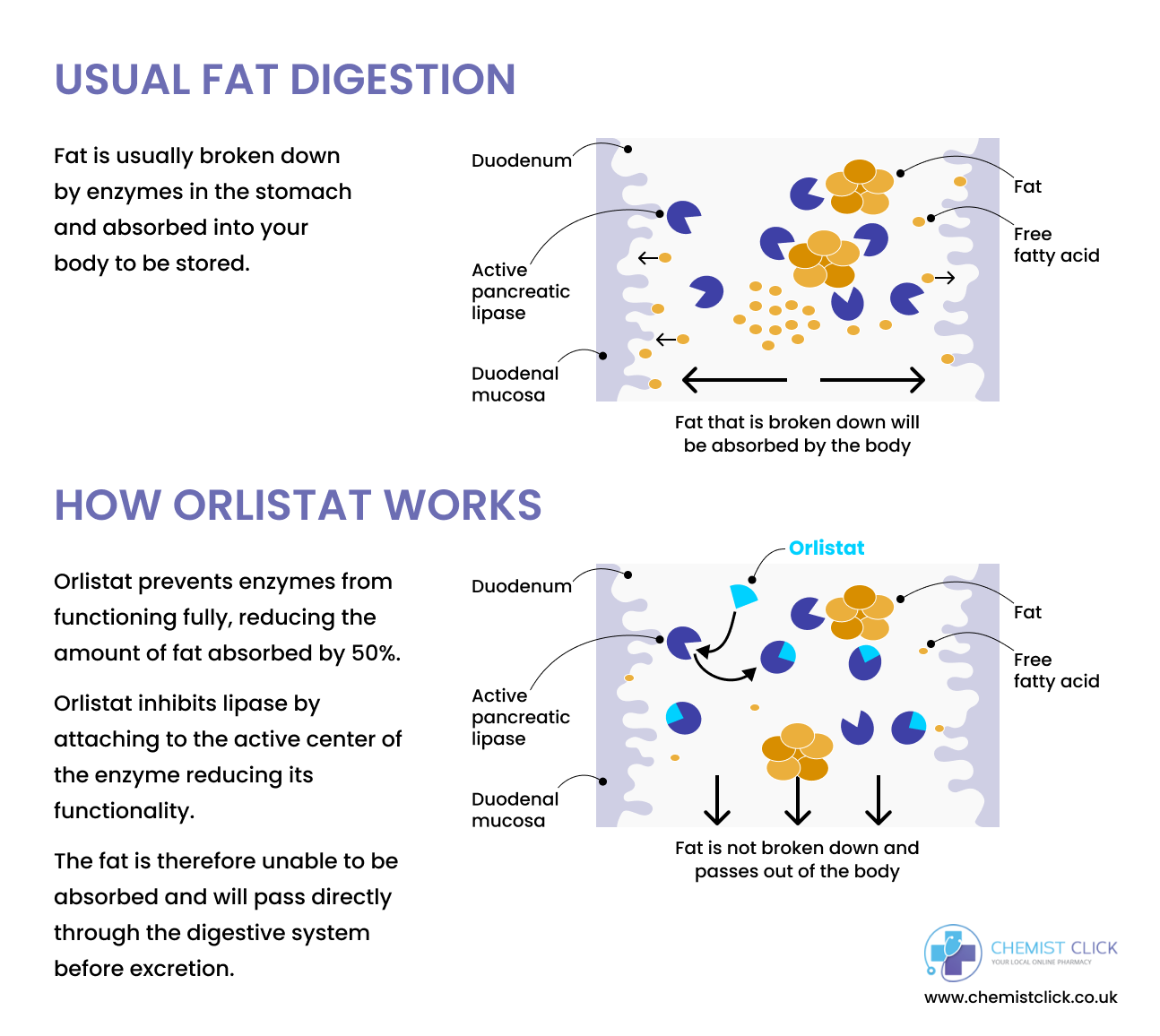Does Orlistat work?

Content by

Last Updated
Table of Contents
- How does Orlistat work?
- Does Orlistat work?
- How much weight will I lose with Orlistat?
- How do I take Orlistat?
- Orlistat before and after
- Before taking Orlistat
- Whilst taking Orlistat
- After taking Orlistat
- Orlistat results
- What are the side-effects of Orlistat?
- Why do I need vitamins with Orlistat?
How does Orlistat work?
Usually, dietary fat is broken down by enzymes in the digestive system and stored in the body. Orlistat blocks enzymes from breaking down fat, which means it cannot be stored in the body. Instead, 30-40% less fat is absorbed, which is then expelled from the body in the form of faeces.

Does Orlistat work?
One clinical trial studying the effects of orlistat on weight loss in 743 overweight patients, found that after the first year, those taking orlistat had lost on average 10.3kg of weight.
Another clinical trial has looked at the effects of Orlistat over a 6-month period in 80 obese individuals. After 6 months, Orlistat had caused a 4.65kg reduction in weight, a 1.91kg/m2 reduction in BMI, a 4.84cm reduction in waist circumference, as well as a reduction in cholesterol levels.
So yes, clinical trials and research suggest that Orlistat is an effective method in reducing weight. For optimum results, it is important to use orlistat in conjunction with a calorie reduced diet and an exercise plan. During clinical trials, orlistat has also shown to have a positive impact on blood pressure, cholesterol and diabetes.
How much weight will I lose with Orlistat?
Extensive research has demonstrated that Orlistat is effective for weight loss. However, whilst Orlistat is clinically proven to help lose weight, it is difficult to predict exactly how much weight will be lost. In theory, during the clinical trials, those that took orlistat compared to those that didn’t, lost on average around 50% more weight. This implicates that if you were to lose 8kg without orlistat, you would lose 12kg whilst taking it. However, this is theoretical. Everybody is different and we all respond to treatment and lifestyle changes in different ways. It is important to note that weight loss occurs where there is a calorie deficit. Orlistat helps to reduce the absorption of fat, which means your body will be consuming less calories. By following a calorie-reduced diet, you can expect to see the positive results that Orlistat has on weight loss. Exercising regularly will also help to achieve a calorie deficit, as many of the calories consumed, will be burnt and used up as energy supplies whilst exercising. Much of the weight loss process lies with how much effort you are willing to put in, with regards to following a disciplined eating and exercise regime. Orlistat blocks the absorption of 30-40% fat consumed from your diet and whilst it is difficult to predict how much weight you will lose with Orlistat, if you are able to put into practice a healthy lifestyle, in almost all cases, Orlistat will exert its beneficial effect.
How do I take Orlistat?
Take one Orlistat capsule just before, during, or no later than one hour after your main meals (breakfast, lunch and dinner). Each capsule should be swallowed whole with water. Please note that if a meal has no fat, an orlistat capsule is not required. Snacks that contain fat should be avoided in-between meals.
Your daily fat intake should not exceed 30% of your daily calorie intake. For example, if you consume 1,600 calories a day, a maximum of 480 calories (which is 30% of 1,600 calories) can come from fat. It is advisable to look at the nutritional content information that is available on most food packaging to help you.
Orlistat before and after
Orlistat can help with weight loss; however, commitment and effort are still required to make this process successful. While this can be difficult, some actions can be taken to make this commitment easier. Properly preparing beforehand and keeping yourself motivated are key factors to successful weight loss.
Before taking Orlistat
Preparation prior to taking orlistat will aid immensely in this transition. Firstly, mental preparation will help prevent discouragement in the future. Everybody is different, so what is done to prepare mentally will be different for each person. If you're unsure where to start, one recommendation would be to start journaling. Writing down goals and motivations for weight loss will provide something tangible to look back on in the future.
Considering that a calorie deficit is essential for weight loss, it will also be necessary to create a dietary plan before getting started. When formulating a dietary plan, the goal is a calorie consumption that is less than the number of calories burned throughout the day. With that in mind, a diet should be personally attainable whilst achieving that calorie deficit. Whilst taking orlistat, keep in mind that you shouldn't be consuming more than 30% of your calories as fat, which should be accounted for in your diet.
Creating an exercise routine will also help to reach a calorie deficit. Exercising burns calories, making it easier to create a daily deficit. Regular exercise will also improve your physical and mental health, both of which will increase the success rate of losing weight. Before taking orlistat, it may also be a good idea to take a picture of yourself so that you can monitor your progress.
Whilst taking Orlistat
Following through with your dietary plan and regularly maintaining a calorie deficit will be your primary goal whilst taking orlistat. Keeping up with your exercise plan will help both the body and mind during this process.
Whilst some find it challenging to stay motivated during this stage, keeping track of progress will help maintain motivation. Weighing oneself is a great way to track progress. However, weight tracking should be done weekly basis and not daily. Weight can fluctuate each day, so weekly monitoring of your weight will give you an accurate representation of your weight loss. Another method of progress tracking is through taking pictures. As people are able to see themselves regularly, it can be difficult to see when changes are happening to their bodies. Taking photos allows you to view all those small changes over time. Taking these images can feel uncomfortable at the start, but those feelings should wear off over time, especially once you start to see progress.
After taking Orlistat
Once you have reached your target weight loss, which is usually a BMI reading under 30, you do not need to continue to take orlistat. However, this does not mean reverting to prior habits. Continuing with a healthy diet and calorie deficit will ensure further weight
Continued exercise, as well as monitoring your weight will also aid with further weight loss. Additionally, it is possible that there will be setbacks faced while trying to lose weight. This is completely normal. The best step to take in this case would be to keep going with the set plan and making adjustments to prevent future setbacks.
Orlistat results
With correct usage, orlistat will successfully lead to a healthier body and weight. Establishing a dietary plan and exercise routine is essential to living a healthy lifestyle. Following through with a good diet and regular exercise will maintain that weight loss in the long term.
What are the side-effects of Orlistat?
As with all medication, some people may experience side-effects when taking orlistat. Most side-effects generally pass after a week or so, once your body has gotten used to orlistat. Common side-effects of orlistat include:
- Fatty or oily stools
- Passing stools more often
- Oily spotting on underwear
- Passing wind more often
- Stomach aches
- Headaches
Orlistat works by reducing the amount of fat your body absorbs. The fat that is not absorbed leaves your body in the form of faeces. Most of the above side-effects are much less likely to occur if you stick to a low-fat diet.
Women taking the contraceptive pill and orlistat must follow the advice for a missed pill if they experience diarrhoea whilst taking orlistat.
Why do I need vitamins with Orlistat?
When using orlistat, it is advised to take Vitamins A, D, E and K. These are known as fat-soluble vitamins. Orlistat blocks the absorption of fat in the body, which can impact the amount of fat-soluble vitamins that your body receives. Taking a multi vitamin that contains vitamins A, D, E and K is therefore advisable.
Whilst all of our content is written and reviewed by healthcare professionals, it is not intended to be substituted for or used as medical advice. If you have any questions or concerns about your health, please speak to your doctor.
